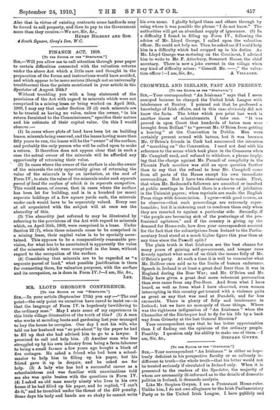CROMWELL AND IRELAND, PAST AND PRESENT. [To THE ED/T011 OF
TEE " Eincervroa."]
Srn,—Your correspondent "An Irishman" says that I seem annoyed because he charged the United Irish League with intolerance at Bantry. I pointed out that he professed a knowledge of Irish affairs, and in this case obviously did not know the facts. The letter which you print last week is another tissue of misstatements. I take one. " It was proved in open Court that hundreds of baton men were brought from Belfast" to "prevent Mr. O'Brien from getting a hearing" at the Convention in Dublin. Men were certainly present armed with batons, but it was because Mr. O'Brien's friends in Cork had announced the intention of "marching on" the Convention. I need not deal with his reference to the scene which took place in the Commons when Mr. Campbell used, and refused to withdraw, a phrase imply. ing that the charge against Mr. Parnell of complicity in the Phoenix Park murders was still an open question further than to say that the refusal to hear Mr. Campbell came from all parts of the House except his own immediate surroundings. But I have two observations to make. First, that when Mr. Redmond's followers are assaulted or insulted at public meetings in Ireland there is a chorus of jubilation in the Unionist papers ; when reprisals are made, the English Press rings with denunciation. I agree—with good reason, as he observes—that such proceedings are extremely repre- hensible; but it is sickening cant to condemn them only when they are resorted to against a particular side. Secondly, if " the people are becoming sick of the posturings of the pro- fessional agitators," and if the country is giving up the demand for Home-rule, how does your correspondent account for the fact that the subscriptions from Ireland to the Parlia- mentary fund stand at a much higher figure this year than at any time since the Parnell split ?
The plain truth is that Irishmen see the best chance for many years of gaining self-government, and temper runs fiercely against what most of us think the insane folly of Mr.
O'Brien's party. At such a time it is well to remember what Mr. Balfour once said as to the limits of human endurance.
Speech in Ireland is at least a great deal freer than it was in England daring the Boer War; and Mr. O'Brien and Mr. Healy have given a great deal more vehement provocation than ever came from any Pro-Boer. And from what I have heard, as well as from what I have observed, even women interrupting in this country get treated with a violence quite as great as any that was used at Dundalk, and far less excusable. There is plenty of folly and intolerance in Ireland; but we have no monopoly of these things. Where was the righteous indignation of "An Irishman" when the Chancellor of the Exchequer had to fly for his life by a back way from Grimsby at the last General Election ?
Your correspondent says that he has better opportunities than I of finding out the opinions of the ordinary people. Possibly. I question only his ability to make use of them.—I










































 Previous page
Previous page